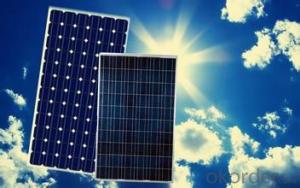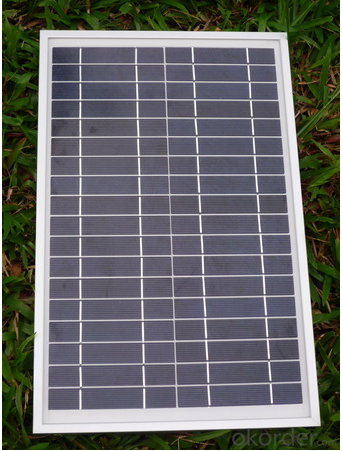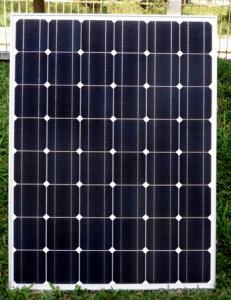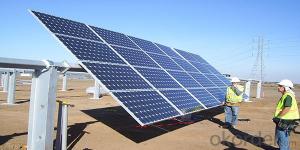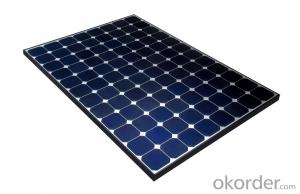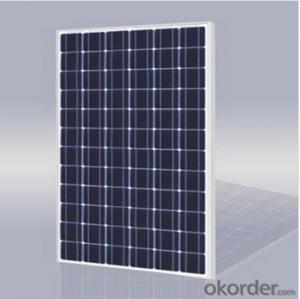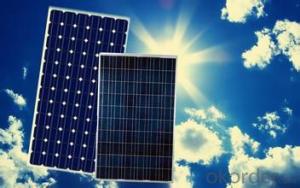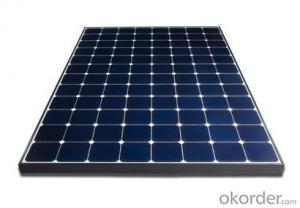Ecs Solar Energy Systems 66kw CNBM Monocrystalline Silicon Panel for Home Use
- Loading Port:
- Tianjin
- Payment Terms:
- TT OR LC
- Min Order Qty:
- 50 watt
- Supply Capability:
- 1000 watt/month
OKorder Service Pledge
OKorder Financial Service
You Might Also Like
Specification
66KW CNBM Monocrystalline Silicon Panel for Home Using
Production description
Solar energy is radiant light and heat from the Sun harnessed using a range of ever-evolving technologies such assolar heating, photovoltaics, solar thermal energy, solar architecture and artificial photosynthesis.
It is an important source of renewable energy and its technologies are broadly characterized as either passive solar oractive solar depending on the way they capture and distribute solar energy or convert it into solar power. Active solar techniques include the use of photovoltaic systems
Off-the-grid homes are autonomous; they do not rely on municipal water supply, sewer, natural gas, electrical power grid, or similar utility services. A true off-grid house is able to operate completely independently of all traditional public utility services. The idea has been recently popularized by certain celebrities including Ed Begley, Jr.[1] who stars in Living with Ed[2] television show on the Home & Garden Television (HGTV) network. Actress Daryl Hannahpromotes off-grid living and constructed her home in Colorado according to those principles, as does survival expert and Dual Survival co-star Cody Lundin,[3]who lives in a self-designed, passive solar earth house in the high-desert wilderness of Northern Arizona, collecting rainwater, composting waste, and paying nothing for utilities.[4][5]
The large magnitude of solar energy available makes it a highly appealing source of electricity. The United Nations Development Programme in its 2000 World Energy Assessment found that the annual potential of solar energy was 1,575–49,387 exajoules (EJ). This is several times larger than the total world energy consumption, which was 559.8 EJ in 2012.
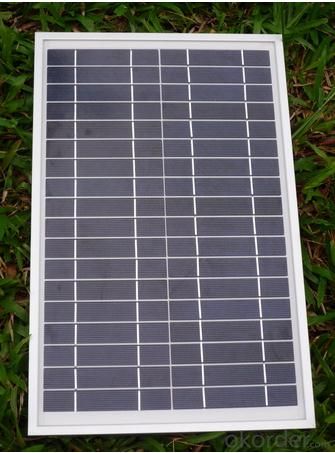
Feature
1.High conversion efficiencies resulting in superior power output performance.
2.Outstanding power output even in low light or high temperature conditions
3.Optimized design for ease of soldering and lamination
Physical characteristic
1. Rigorous quality control meets the highest international standards.
2. High-transmissivity low-iron tempered glass, strong aluminium frame.
3. Using UV-resistant silicon.
4. IS09001/14001/CE/TUV/UL
Packaging
26pcs in one carton 6pallets in 20foot container 14pallets in 40 foot container.
- Q: Can solar energy systems be used for powering electric vehicle solar charging stations at highways?
- Yes, solar energy systems can certainly be used to power electric vehicle (EV) solar charging stations at highways. Solar power is a clean and renewable energy source that can be harnessed through photovoltaic (PV) panels. These panels convert sunlight into electricity, which can then be used to charge EVs. Highways are often exposed to ample sunlight, making them ideal locations for solar charging stations. By utilizing solar energy, these charging stations can operate off-grid, reducing dependence on traditional power sources and minimizing environmental impact. Additionally, solar charging stations can be installed along highways without the need for extensive infrastructure development, as they do not require connection to the electrical grid. Solar-powered EV charging stations offer several benefits. First, they provide a sustainable and carbon-free method of charging EVs, helping to reduce greenhouse gas emissions and combat climate change. Second, they contribute to the development of a decentralized energy system, as they are independent of the electrical grid. This decentralization can enhance energy security and resilience, as well as increase the overall reliability of the charging infrastructure. Moreover, solar charging stations can have economic advantages. As the cost of solar panels continues to decrease and the efficiency of PV technology improves, the installation and maintenance costs of solar charging stations are becoming increasingly competitive with traditional charging infrastructure. Furthermore, solar charging stations can generate additional revenue through excess energy production, as any surplus electricity can be sold back to the grid. In conclusion, solar energy systems are a viable and sustainable solution for powering electric vehicle solar charging stations at highways. They offer environmental benefits, promote energy independence, and can contribute to cost savings. As the adoption of EVs continues to grow, the integration of solar energy into the charging infrastructure will play a crucial role in creating a greener and more sustainable transportation system.
- Q: How do solar energy systems contribute to reducing carbon emissions?
- Solar energy systems contribute to reducing carbon emissions in several ways. Firstly, solar energy is a renewable and clean source of power. Solar panels harness sunlight and convert it into electricity without any emissions of greenhouse gases. This means that when solar energy is used to generate electricity, it does not release carbon dioxide or any other harmful pollutants into the atmosphere, unlike traditional fossil fuel power plants. Secondly, solar energy can replace the use of fossil fuels in various sectors. For example, solar panels can be installed on residential rooftops to provide electricity for homes, reducing the need for electricity generated from coal or natural gas. Similarly, solar farms can be established to produce large-scale solar power for commercial and industrial purposes. By displacing the use of fossil fuels, solar energy systems help to lower carbon emissions associated with electricity generation. Moreover, solar energy can also be used for heating purposes. Solar thermal systems can capture and utilize the sun's heat to provide hot water for residential and commercial buildings. By utilizing solar thermal systems, the demand for gas or electricity to heat water is reduced, resulting in a decrease in carbon emissions from water heating processes. Furthermore, the widespread adoption of solar energy systems can lead to a decrease in the overall demand for fossil fuels. As more households, businesses, and industries switch to solar power, the demand for coal, oil, and natural gas decreases. This reduced demand for fossil fuels can drive down their production and consumption, resulting in a significant reduction in carbon emissions associated with extracting, refining, and burning these fuels. In summary, solar energy systems contribute to reducing carbon emissions by producing clean and renewable electricity, replacing the use of fossil fuels, reducing the demand for traditional energy sources, and providing an alternative for heating purposes. By transitioning to solar power, we can significantly mitigate the impact of climate change and work towards a more sustainable future.
- Q: How do solar energy systems affect wildlife and ecosystems?
- Solar energy systems have minimal negative impacts on wildlife and ecosystems compared to other energy sources. While the construction and operation of these systems may disrupt habitats temporarily, they do not emit greenhouse gases or harmful pollutants. Proper planning and implementation can mitigate potential risks, ensuring that solar energy remains a sustainable and environmentally friendly choice.
- Q: How do solar energy systems impact renewable energy targets?
- Solar energy systems have a significant positive impact on renewable energy targets. By harnessing the power of the sun, these systems generate clean and sustainable electricity, reducing our reliance on fossil fuels. Solar energy contributes to increasing the overall share of renewable energy in the energy mix, helping countries achieve their renewable energy targets and combat climate change.
- Q: Are solar energy systems suitable for residential use?
- Yes, solar energy systems are suitable for residential use. They provide a clean and renewable source of energy, reduce electricity bills, and help homeowners become more self-sufficient. With advancements in technology and decreasing costs, solar energy systems have become increasingly popular and accessible for residential use.
- Q: Can solar energy systems be used for powering electric vehicles charging stations?
- Yes, solar energy systems can be used to power electric vehicle charging stations. Solar panels can generate electricity from sunlight, which can then be stored in batteries or directly used to charge electric vehicles. This renewable energy source is environmentally friendly and can help reduce the carbon footprint associated with transportation.
- Q: Can a solar energy system be used in areas with high levels of air pollution?
- Indeed, areas with high levels of air pollution can still utilize solar energy systems. Although the efficiency of solar panels may be diminished by air pollution, it does not completely impede their ability to generate electricity. In polluted regions, solar energy systems continue to operate and produce power. It is worth mentioning, however, that the system's efficiency may be slightly reduced due to the decreased amount of sunlight reaching the panels. Regular cleaning and maintenance of the solar panels can help alleviate the impact of air pollution on their performance. Furthermore, advancements in solar technology are being pursued to enhance panel efficiency in polluted environments. For instance, anti-soiling coatings are being developed to prevent dust and pollutants from adhering to the panels. Overall, even in areas with substantial air pollution, solar energy systems remain a feasible and sustainable source of electricity.
- Q: Can solar energy systems be used in cloudy or rainy areas?
- Indeed, solar energy systems retain their usability in areas with cloudy or rainy weather conditions. While it holds true that solar panels function optimally under direct sunlight, they possess the capability to generate electricity even when confronted with cloudy or rainy days. Solar panels are engineered to capture both direct sunlight and diffuse sunlight, which refers to sunlight that permeates through clouds. Despite the reduction in solar panel efficiency during cloudy or rainy conditions, they are still capable of generating a substantial amount of electricity. Furthermore, solar energy systems can be combined with energy storage technologies, such as batteries, to preserve excess energy generated on sunny days for later use during cloudy or rainy periods. Consequently, solar energy systems present a viable and sustainable option for electricity generation in areas with cloudy or rainy climates.
- Q: What is the impact of roof angle on the performance of solar panels?
- The performance of solar panels is significantly impacted by the angle of the roof. The ideal angle of the roof depends on the location and time of year when the installation takes place. In order for solar panels to perform at their best, they should be tilted at an angle that allows them to capture the maximum amount of sunlight throughout the day. This is because the angle affects the amount of direct sunlight that falls on the panels, which directly influences their energy production. In areas closer to the equator, where the sun is directly overhead, it is generally recommended to have a roof angle of around 30 to 45 degrees. This allows the panels to receive the highest amount of sunlight throughout the year. On the other hand, in regions that are farther from the equator and have a lower position of the sun in the sky, a steeper roof angle of approximately 45 to 60 degrees may be more suitable to optimize the performance of solar panels. The impact of the roof angle on solar panel performance is also noticeable during different seasons. For instance, during the summer when the sun is higher in the sky, a flatter roof angle may be more effective in capturing sunlight. Conversely, during the winter when the sun is lower, a steeper roof angle can help maximize the production of energy. It is important to keep in mind that while the roof angle is a crucial factor, there are other factors that can also affect the performance of solar panels. These include the orientation of the panels (preferably facing south in the Northern Hemisphere) and the presence of shading from nearby objects or trees. Proper planning and design are essential to ensure the solar panel system operates optimally and efficiently.
- Q: Can solar energy systems be used in areas with limited access to skilled labor?
- Yes, solar energy systems can be used in areas with limited access to skilled labor. Solar energy systems are designed to be simple and easy to install, requiring minimal technical expertise. With proper training and guidance, individuals with limited skills can learn to install and maintain solar panels. Additionally, advancements in technology have made solar systems more user-friendly, reducing the need for specialized knowledge. This makes solar energy a viable option for areas with limited access to skilled labor, providing clean and sustainable energy solutions.
Send your message to us
Ecs Solar Energy Systems 66kw CNBM Monocrystalline Silicon Panel for Home Use
- Loading Port:
- Tianjin
- Payment Terms:
- TT OR LC
- Min Order Qty:
- 50 watt
- Supply Capability:
- 1000 watt/month
OKorder Service Pledge
OKorder Financial Service
Similar products
Hot products
Hot Searches
Related keywords
